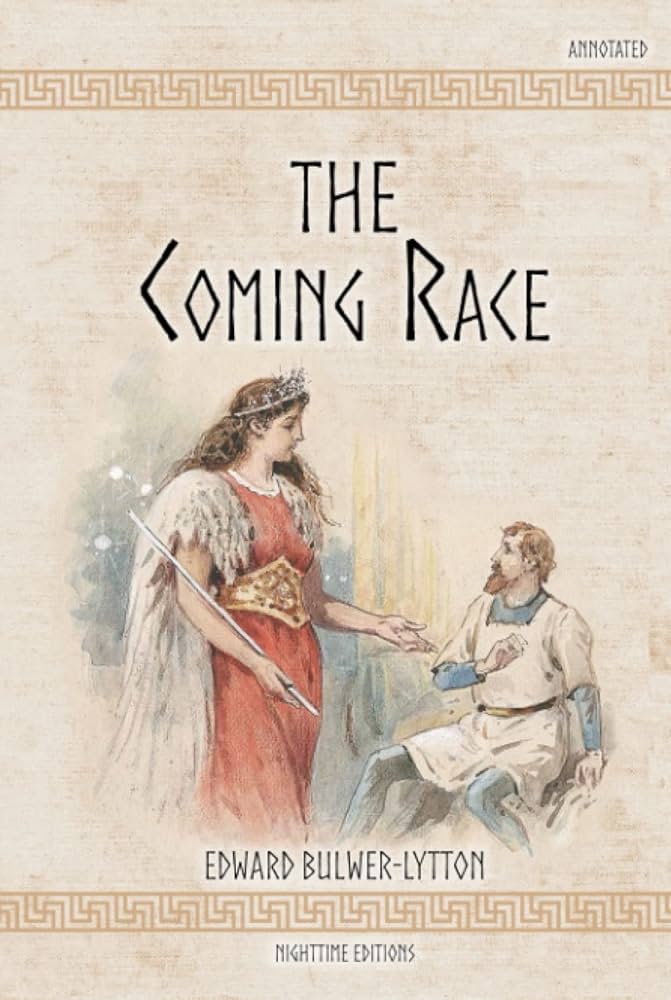Chapter IV — The coming Race
byChapter IV of The Coming Race opens as the narrator continues deeper into the unknown world beneath the earth’s surface, stumbling upon a structure that defies both conventional architecture and his expectations of underground life. The building, partially sculpted from stone and adorned with patterns reminiscent of ancient cultures, radiates a strange harmony with nature. Columns stretch upward, wrapped in vines and crowned by flora unfamiliar to his eyes, suggesting a culture that merges construction with the organic world rather than conquering it. This peculiar balance of craftsmanship and natural elegance is both inviting and unnerving, as though the structure breathes with an intelligence of its own. As he approaches the entrance, a strong sense of unease begins to grow, not because of what is seen, but because of what feels imminent. A tension lingers in the air, like that preceding a storm, as if this building exists not simply as shelter but as a threshold to another order of life.
The narrator’s approach is halted by the sudden appearance of a figure, both majestic and unsettling. This being’s height, while not monstrous, commands presence, and its attire—wings folded across its chest, a delicate yet firm tunic, and a material that defies earthly classification—suggests not only function but ceremonial importance. Atop its head rests a diadem embedded with luminescent stones, and in one hand it carries a rod that pulses faintly with energy. The most captivating feature, however, is the face: it blends aesthetic harmony with an alien severity, eyes deep and dark as if they contain the memory of forgotten worlds. The narrator is struck by the sense that this creature, though humanoid, belongs to a strain of evolution that outpaced his own. It is not the physical form that frightens him but the calm authority it radiates—a stillness that feels absolute, as if nothing could disturb it. He is not in the presence of violence, yet a primal instinct warns him that his role here is not that of an equal.
The air thickens with a strange awe as the creature makes no move to attack, yet its composure carries a message of dominance more complete than any display of force. The narrator, though trained in reasoning and exploration, feels his confidence falter. This being—unarmed in appearance, unhurried in movement—somehow embodies a power that needs no expression. The staff it holds is not brandished, yet its subtle shimmer speaks of unseen capabilities. His scientific instincts urge him to analyze and interpret, but something deeper within whispers that he is now far outside the realm of logic or precedent. Every feature, from the creature’s expression to the posture of relaxed alertness, communicates a civilization advanced not just technologically, but emotionally and intellectually. The narrator stands motionless, unsure whether to speak, bow, or flee.
With slow grace, the figure gestures for him to follow, not with command but invitation—though refusal feels impossible. As he steps into the structure’s interior, the tension recedes but is replaced with wonder. Light, not sourced from flame or bulb, glows from the walls, soft and steady, casting no shadows. The air is fresh, though they are buried deep beneath the earth. It dawns on him that the being who led him is not alone, but part of a society far removed from the surface world in every way. There is no sense of threat, yet the overwhelming precision and harmony of his surroundings suggest an order of life that brooks no disruption. The narrator begins to feel that perhaps his presence alone might ripple this balance, not through action, but through being fundamentally out of place in a world so deeply refined.
As he walks further, guided but not coerced, he reflects on how his earlier fears now shift toward introspection. This encounter has not only shown him an advanced species but has also revealed the limits of his own assumptions. He begins to suspect that knowledge in this world is not merely stored in books or passed through speech—it might be embedded in the very material of the walls, the design of the halls, or even the resonance of silence itself. A society that has mastered vril, the force alluded to but not yet understood, has likely mastered much more than power—it has likely unlocked a new way of existing. And in that realization, he senses that what lies ahead is not simply discovery but transformation.


